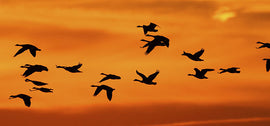Aquaculture – Fish farming around the world has increased 50-fold over the last few decades and continues to grow worldwide, and all sustain damage and lost revenue from a broad diversity of birds. Crawfish farmers in Louisiana, tropical fish farmers in Florida, bait fish farmers in Arkansas, and catfish farmers in California, Mississippi, Arkansas, Alabama, and Louisiana all sustain serious losses due to birds that cost the industry millions of dollars each year. We are aware of a single catfish farm reporting large losses due to birds feeding on smaller fish and fingerlings.
Barramundi (Asian sea bass) farms in Australia was losing up to 20% of their product due to migrating pelicans, and one of those farms – Sealord King Reef – and have implemented some of the newer bird control methods for their unique site problems with success.
Flock Free Bird Control will be working with the catfish farmer in the next couple weeks to introduce a number of new technologies. This farm has tried a variety of control solutions, but they need a better solution.
When we approach a new potential aquaculture site, Flock Free looks at incorporating a combination of the technologies below into a full-scale program to stop these birds. Any single approach will be doomed to fail as the birds are literally living on the buffet and have everything they need at the farm. Only the combination of complimenting irritants work for a successful integrated bird control program for aquaculture/agriculture.
Flock Free Bird Control's IBC system for agriculture is designed around five basic components
- Evaluate Variables
Target birds, population levels, crop loss percent, size of project, difficulty, solutions - Preventive Measures
Determine the correct time line of potential damage to begin process - Implement control methods
Install multi-dimensional pain/consequence program - Monitor
Find any weakness in initial program and refine while monitoring population reduction
Where the majority of bird control processes fail, is in the lack maintaining negative pressure on birds. Usually, a unique control measure is introduced producing some success, then birds become adjusted to it and then the control measure totally fail. The goal that has to be achieved is to maintain control pressure on the birds at a higher level than they will put up with using a multi-dimensional program that birds won’t adjust to.
Flock Free Bird Control creates this volume of negative pressure with a wide variety of methods;
Hazers delivering methyl anthranilate will irritate their trigeminal nerve causing intense irritation.
VRAD is like a canon on steroids that not only emits a huge concussion (sound) but also will literally shake the hollow-boned birds to the core.
Flock reflectors will be used to give a visible association to the invisible VRAD and Hazers
For more information, Contact Flock Free Bird Control for the solution to your Agricultural or Aquacultural Bird Problem


